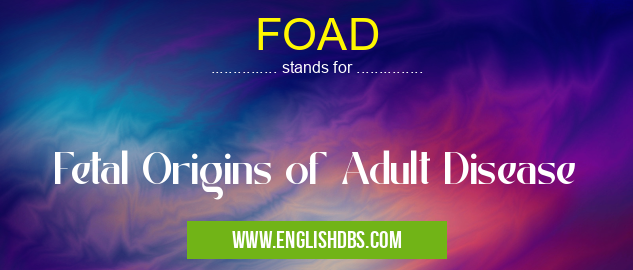What does FOAD mean in PHYSIOLOGY
FOAD stands for Fetal Origins of Adult Disease and is a medical concept that suggests that many diseases, like diabetes, heart disease, and even mental health issues, can be traced back to fetal development. This means the earliest stages of life may have a lasting impact on an individual’s long-term health. Since FOAD was first observed and described in the early 1990s, researchers have worked to understand how an individual’s fetal development affects their adult health.

FOAD meaning in Physiology in Medical
FOAD mostly used in an acronym Physiology in Category Medical that means Fetal Origins of Adult Disease
Shorthand: FOAD,
Full Form: Fetal Origins of Adult Disease
For more information of "Fetal Origins of Adult Disease", see the section below.
» Medical » Physiology
What Is FOAD?
FOAD is a hypothesis that looks at how early life events, from conception through adolescence, can affect the risk of developing certain chronic conditions during adulthood. The theory holds that events that occur during fetal development can shape an individual’s future health outcomes. For example, if a baby experiences nutritional deficiencies while in utero or during infancy or childhood, they may be more likely to develop conditions such as obesity later in life due to changes in metabolism caused by those nutritional deficiencies. Other environmental factors such as exposure to toxins or stressors could also alter an individual's future risk for diseases like diabetes or heart disease.
Implications Of FOAD
The idea behind FOAD suggests that doctors should look beyond just treating the symptoms of illnesses when it comes to preventing them from occurring in adulthoods. Prevention starts before birth with things like avoiding smoking and alcohol consumption while pregnant and establishing healthy nutrition habits even before conception. Furthermore, prenatal care has been shown to reduce the likelihood of low birth weight babies who are more prone to chronic health problems later on in life. It's important for parents to recognize the potential consequences of their lifestyle choices when it comes to their children's long-term health outcomes.
Essential Questions and Answers on Fetal Origins of Adult Disease in "MEDICAL»PHYSIOLOGY"
What is the Fetal Origins of Adult Disease (FOAD)?
FOAD is a hypothesis which states that the health of an individual as an adult could be related to environmental conditions experienced during fetal development. This process is known as programming, where the environment can permanently change the way cells and organs function later in life.
How does FOAD work?
FOAD suggests that environmental effects experienced by a fetus can cause changes in cell development and gene expression at critical stages, leading to permanent alterations throughout adulthood. These changes could potentially increase a person's risk to developing chronic diseases such as diabetes, heart disease, and obesity.
Are there any benefits associated with FOAD?
With further research into the impacts of the environment on fetal development, we may be able to develop new preventive strategies for chronic diseases - ones that focus on optimizing environment during pregnancy. Such strategies would not only decrease risk for diseases but also increase potential for positive health outcomes in adults.
Who proposed the FOAD hypothesis?
The concept was first proposed by British epidemiologist David Barker in 1991 based on his observation of patients with coronary heart disease being born with lower birth weight than those without it. Since then, more studies have been conducted to better understand how various environmental factors can affect fetal growth and later lead to chronic diseases in adulthood.
What impact does lifestyle have on FOAD?
Lifestyle choices such as diet, smoking/drinking habits and physical activity levels are known to play an important role in programming a fetus’ development during pregnancy; these same lifestyle factors could also influence risks of developing chronic diseases in adulthood - putting children at greater risk if their parents do not take care of themselves properly during their pregnancy.
Does poverty contribute to FOAD?
Several studies have shown that living in poverty increases risks for poor nutrition or inadequate prenatal care - both of which can lead to adverse programming effects on fetal development and growth that put individuals at greater risk for chronic diseases later in life.
At what age can someone start experiencing consequences from FOAD?
The consequences from adverse fetal programming can occur throughout one’s entire life; from infancy through old age - suggesting that proper maternal health should be maintained before conception all throughout pregnancy due its importance for long-term wellbeing later down the line.
Final Words:
FOAD is an emerging field within medical science that has significant implications for both public policy and personalized medicine. By understanding how early life events influence adult health outcomes we can better inform policy decisions related to prenatal care access or maternal nutrition programs; while also helping clinicians provide more personalized treatments tailored towards individuals at risk for certain chronic illnesses due to earlier exposures or developmental experiences
